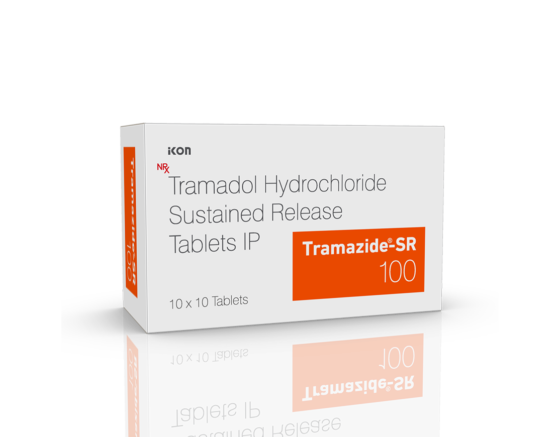Uncategorized
Tramadol SR Tablet 100mg: Uses, Benefits, and Important Information
Tramadol SR Tablet 100mg , Tramadol SR Tablet 100mg is a sustained-release formulation of tramadol, a prescription pain medication used to treat moderate to severe pain. The “SR” in its name stands for “sustained release,” which means that the medication is released slowly over time, providing longer-lasting pain relief compared to immediate-release versions of tramadol.
What is Tramadol SR 100mg Used For?
Tramadol SR 100mg is commonly prescribed to individuals who experience chronic pain that requires long-term management. The sustained-release nature of the tablet allows patients to take fewer doses throughout the day while still achieving consistent pain relief. Some common conditions where Tramadol SR 100mg is prescribed include:
- Chronic Pain Conditions: This includes pain from conditions like osteoarthritis, rheumatoid arthritis, or fibromyalgia, where long-term pain management is necessary.
- Post-Surgical Pain: Tramadol SR 100mg can help control post-operative pain that persists for days or weeks after surgery, ensuring that patients remain comfortable as they heal.
- Neuropathic Pain: Neuropathic pain, often caused by nerve damage from conditions like diabetes or sciatica, can be challenging to treat. Tramadol SR 100mg helps manage this persistent nerve pain.
- Cancer-Related Pain: In some cases, patients undergoing cancer treatment may experience significant pain. Tramadol SR 100mg is used to help relieve this pain over an extended period.
How Does Tramadol SR 100mg Work?
Tramadol is classified as an opioid analgesic, but it works in two ways to manage pain. First, it binds to opioid receptors in the brain, which helps reduce the sensation of pain. Second, it increases the levels of serotonin and norepinephrine in the brain, neurotransmitters that help modulate pain and improve mood.
The sustained-release formulation of Tramadol SR 100mg ensures that the medication is released slowly over time, offering consistent pain relief without the need for multiple doses throughout the day.
Dosage and Administration
Tramadol SR 100mg is typically taken once or twice a day, depending on the patient’s medical condition and response to the medication. It is important to follow the doctor’s prescribed dosage carefully. Tramadol SR tablets must be swallowed whole and should not be crushed or chewed, as doing so can release the drug all at once, increasing the risk of side effects.
Potential Side Effects
Like all medications, Tramadol SR 100mg can cause side effects. While many people tolerate the medication well, it’s important to be aware of both common and serious side effects.
Common side effects include:
- Dizziness or lightheadedness
- Drowsiness or fatigue
- Nausea or vomiting
- Constipation
- Headache
Serious side effects may include:
- Seizures: Tramadol can increase the risk of seizures, especially in people who have a history of epilepsy or other seizure disorders.
- Respiratory depression: In rare cases, tramadol can cause slow or shallow breathing, especially when taken in high doses or combined with other central nervous system depressants.
- Serotonin syndrome: This is a rare but serious condition that can occur if tramadol is taken with other medications that increase serotonin levels (e.g., certain antidepressants). Symptoms include agitation, confusion, rapid heart rate, and muscle stiffness.
If you experience any serious side effects, seek immediate medical attention.
Precautions and Warnings
- Dependency and Addiction: Tramadol is an opioid medication, and like other opioids, it carries a risk of dependency and addiction. Patients should use it only as prescribed and inform their doctor if they have a history of substance abuse.
- Interactions with Other Medications: Tramadol can interact with various other medications, including antidepressants, antipsychotics, and other opioid painkillers. Always inform your healthcare provider about any other medications or supplements you are taking to avoid potential interactions.
- Avoid Alcohol: Alcohol should not be consumed while taking Tramadol SR 100mg, as it can increase the risk of serious side effects like drowsiness, dizziness, and respiratory depression.
- Not Suitable for Everyone: Tramadol SR 100mg is not recommended for people with a history of severe breathing problems, seizures, or head injuries. Additionally, individuals with liver or kidney disease may require adjusted dosages.
Conclusion
Tramadol SR Tablet 100mg is an effective option for managing chronic pain conditions that require long-lasting relief. Its sustained-release formulation allows for fewer doses throughout the day while providing consistent pain management. However, it’s important to use this medication under the guidance of a healthcare professional to avoid potential side effects and complications.
If you are considering Tramadol SR 100mg for pain management, consult your doctor to ensure it is the right option for you, and always follow their prescribed guidelines for safe use.

